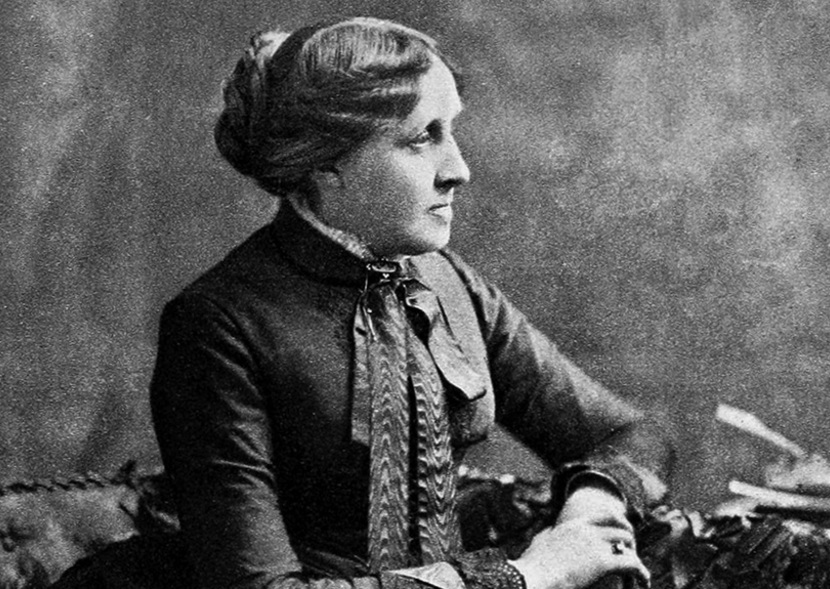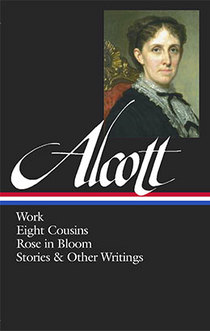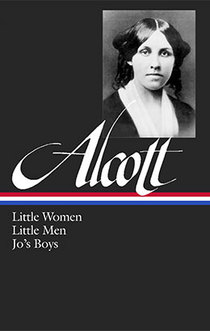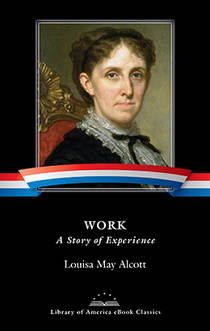
Major works:
Little Women • Little Men • Jo’s Boys
“Reading this novel gave me an exalted sense of myself. It helped me to identify with that young girl and to find comfort in myself when I read it. I felt such esteem for Jo that I was able to tell myself that I too was like her, and therefore it did not matter if society was cruel, because I too would be superior and find my place.”
—Simone de Beauvoir on Little Women
“I drew comfort from my books. Oddly enough, it was Louisa May Alcott who provided me with a positive view of my female destiny. Jo, the tomboy of the four March sisters in Little Women, writes to help support her family, struggling to make ends meet during the Civil War. She fills page after page with her rebellious scrawl, later published in the literary pages of her local newspaper. She gave me the courage of a new goal, and soon I was crafting little stories and spinning long yarns for my brother and sister. From that time on, I cherished the idea that one day I would write a book.”
—Patti Smith, Just Kids (2010)
Louisa May Alcott grew up in an extraordinary community: not only was her father, Bronson, a brilliant if eccentric teacher and philosopher, but neighbors and friends in Concord, Massachusetts, included Ralph Waldo Emerson, Henry David Thoreau, Nathaniel Hawthorne, and Margaret Fuller. Poverty forced Alcott to work from an early age, first as a teacher, governess, and seamstress, but increasingly as a writer, especially after 1863, when at age thirty, Alcott’s memoir of her service as a Civil War nurse in the Union Hospital in Georgetown, D.C., Hospital Sketches, became a best seller. She continued to publish both war stories and thrillers until her publisher, Thomas Niles of Roberts Brothers, suggested in 1867 that she write a book for and about girls. The first part of Little Women was published the next year and became an enormous critical and popular success, making Alcott a literary celebrity. Dedicated to reform throughout her life (often signing her letters “Yours for reform of all kinds”), Alcott especially worked for abolition and women’s suffrage, publishing antislavery stories in The Atlantic Monthly and The Commonwealth and novels such as the early feminist—and autobiographical—Work, and Eight Cousins, which advocated for education and dress reform for women.
Little Women
Louisa May AlcottEvery few weeks she would shut herself up in her room, put on her scribbling suit, and “fall into a vortex,” as she expressed it, writing away at her novel with all her heart and soul, for till that was finished she could find no peace. Her “scribbling suit” consisted of a black pinafore on which she could wipe her pen at will, and a cap of the same material, adorned with a cheerful red bow, into which she bundled her hair when the decks were cleared for action. This cap was a beacon to the inquiring eyes of her family, who, during these periods, kept their distance, merely popping in their heads semi-occasionally, to ask, with interest, “Does genius burn, Jo?” They did not always venture even to ask this question, but took an observation of the cap, and judged accordingly. If this expressive article of dress was drawn low upon the forehead, it was a sign that hard work was going on; in exciting moments it was pushed rakishly askew, and when despair seized the author it was plucked wholly off, and cast upon the floor. At such times the intruder silently withdrew; and not until the red bow was seen gaily erect upon the gifted brow, did any one dare address Jo.


